
Introduction
Blockchain & Web3 Services Trusted By Leaders
- Develop innovative solutions using our state-of-the-art blockchain expertise.
- Achieve accelerated growth with robust & scalable Web3 consulting.
- Unlock 360-degree security with our top-rated blockchain development.
Investing In Crypto Wallet Development: Cost Factors & Features
Cryptocurrencies like Bitcoin and Ethereum are on the verge in the finance industry. With the increasing popularity of digital currencies, the need for cryptocurrency wallets has also surged. Crypto wallets are digital wallets that allow users to store, manage, and trade cryptocurrencies safely. As a result, creating cryptocurrency wallets is now a profitable business venture for both new and established companies. The crypto wallet market size was estimated at USD 8052.98 million in 2022 and is expected to reach USD 40244.7 million by 2028 at a compound annual growth rate (CAGR) of 30.76%. However, before estimating the cost of developing an app, and knowing how to make a crypto wallet, you need to understand what is a crypto wallet and the various factors that influence development expenses. Let’s go into great detail about these factors in this guide:What are Cryptocurrency Wallets?
The Rise of Crypto Wallet Development
In 2024, cryptocurrency wallets are considered a high-profit earning business idea. Making a digital wallet can inspire entrepreneurs, as they store digital assets securely and protect them from theft. Fintech-enthused businesses are adding crypto wallets to their revenue and business model. Let’s check out some important factors that can impact the development cost of a crypto wallet: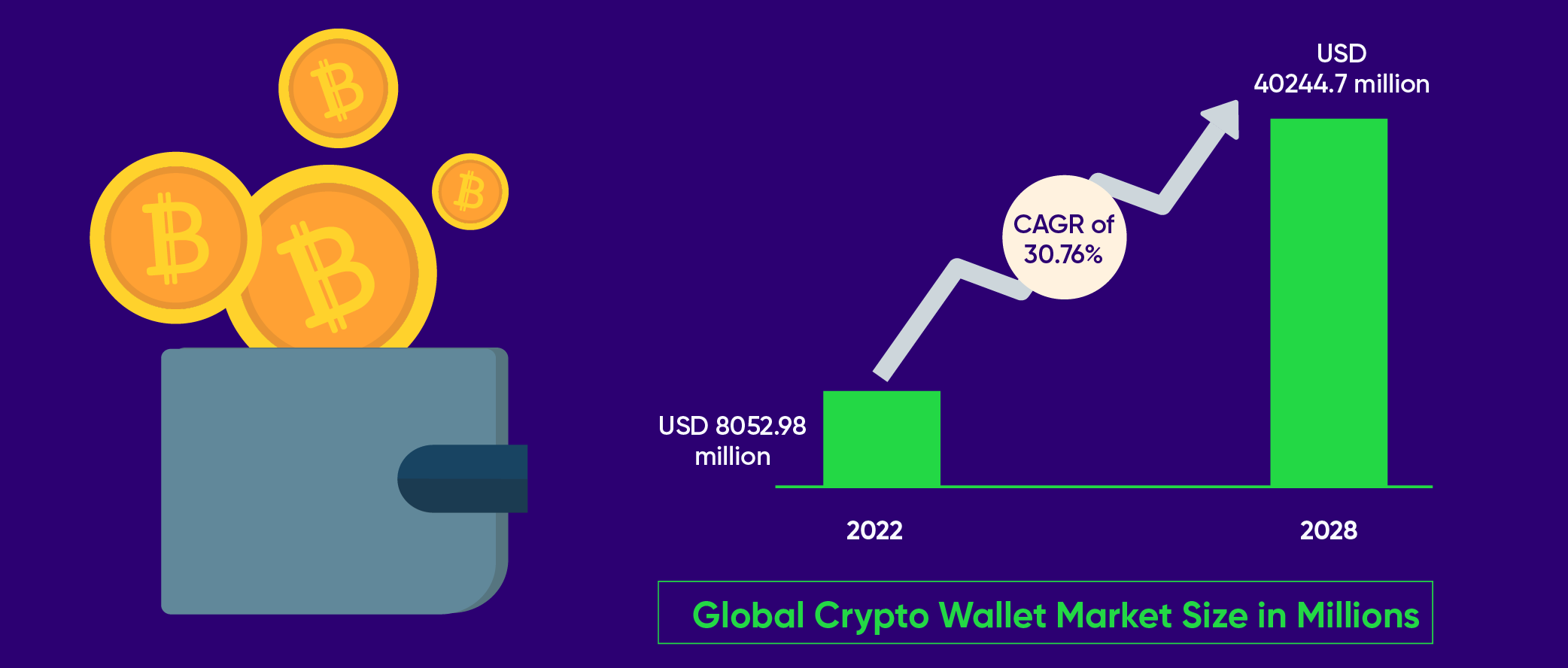
Crypto Wallet Development Cost Factors
Determining the overall cost at once can be a daunting task so it is important to consider these factors to calculate the entire estimated cost for your ease; The development cost of a cryptocurrency wallet app is influenced by various factors that contribute to the final cost, which is influenced by the popularity of cryptocurrency wallet apps due to the rise of digital currencies like Bitcoin and Ethereum. Here are some of them: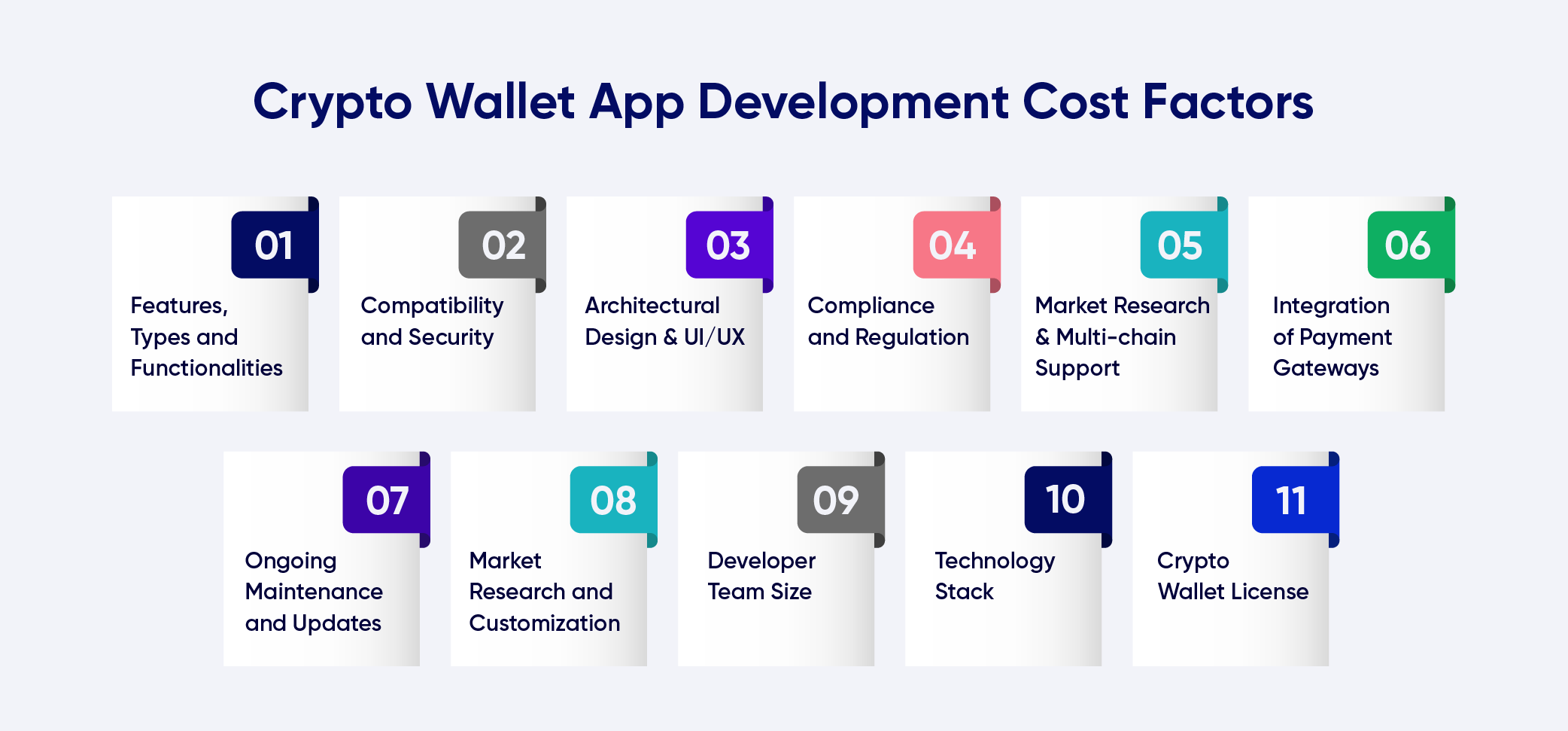
-
Features, Types & Functionalities
The number of features in the app increases the development cost. Startups can choose to develop a full-fledged app despite reducing the number of features. However, choosing the type of crypto wallet can impact overall cost. A browser extension or mobile application can cost between $5,000 and $10,000 for a mobile app and $4,000 to $8,000. The app’s complexity and features significantly influence development costs, with basic wallets being more affordable and advanced wallets requiring multi-currency support and portfolio tracking.
-
Compatibility & Security
The Crypto Wallet app should be cross-platform compatible and should support both Android and iOS users, with hybrid options recommended for increased user count and revenue. However, implementing robust security features like encryption protocols, biometric authentication, and secure key management systems adds complexity and increases costs.
-
Architectural Design & UI/UX
The interface of the crypto wallet app should be easy to use. However, the cost of the front-end design depends on complexity and creativity. Simple designs may be less expensive but may not satisfy users. You should consider creating an intuitive and visually appealing interface that helps enhance the overall user experience and contributes to the development costs.
-
Compliance and Regulation
Crypto wallet app security should have high standards. Adhere to regulatory frameworks like KYC – Know Your Customer Procedures or 2FA for preventing hacks and anti-money laundering – AML.
-
Market Research & Multi-chain Support
Research is the key to success. You need to understand the target audience and conduct market research for your wallet app. It adds value to the development process and ultimately you will be able to develop a better product considering the needs of the users. Crypto traders prefer multi-chain support for Crypto Wallet. So, using different blockchain supports will be helpful to users and can target more audiences but will affect the overall development cost.
-
Integration of Payment Gateways
Crypto wallet apps should have an ecosystem for users that enables them to buy, sell, and exchange cryptocurrencies directly within the app. There should be multiple payment gateways that will require integration with external gateways like Metamask.
-
Ongoing Maintenance and Updates
Before estimating the development cost of a crypto wallet app, you should make a budget for ongoing maintenance that is essential for the long-term success of the crypto wallet app.
-
Market Research and Customization
Research is the key to success. You need to understand the target audience and conduct market research for your wallet app. It adds value to the development process and ultimately you will be able to develop a better product considering the needs of the users.
-
Developer Team Size
The number of developers you hire can impact the overall cost. Remember, developers usually get paid for working every hour in a blockchain app development company and it directly reflects at the end of the cryptocurrency wallet app development cost. Once the developer size gets large, the blockchain wallet cost can multiply.
-
Tech Stack
Old tech stacks are cheaper but as the market demands modern ones, they are not ideal to use, despite being cheaper. Modern tech stack increases cryptocurrency wallet app development costs. Consider using Android apps like Java or Kotlin, iOS apps use Swift.
-
Crypto Wallet License
Many countries have banned Crypto-related businesses as crypto wallet development gave users degrees of freedom. Also, governments have failed to offer licenses. Secondly, the cost of developing a crypto wallet changes with locations. Thus, it is essential to get a license before building your own Crypto Wallet and it can impact the overall development cost.
How to Create a Crypto Wallet?
The world of cryptocurrencies can appear complicated, but digital asset storage doesn’t have to be. Here’s a breakdown of the quick and simple steps of how to develop a cryptocurrency wallet: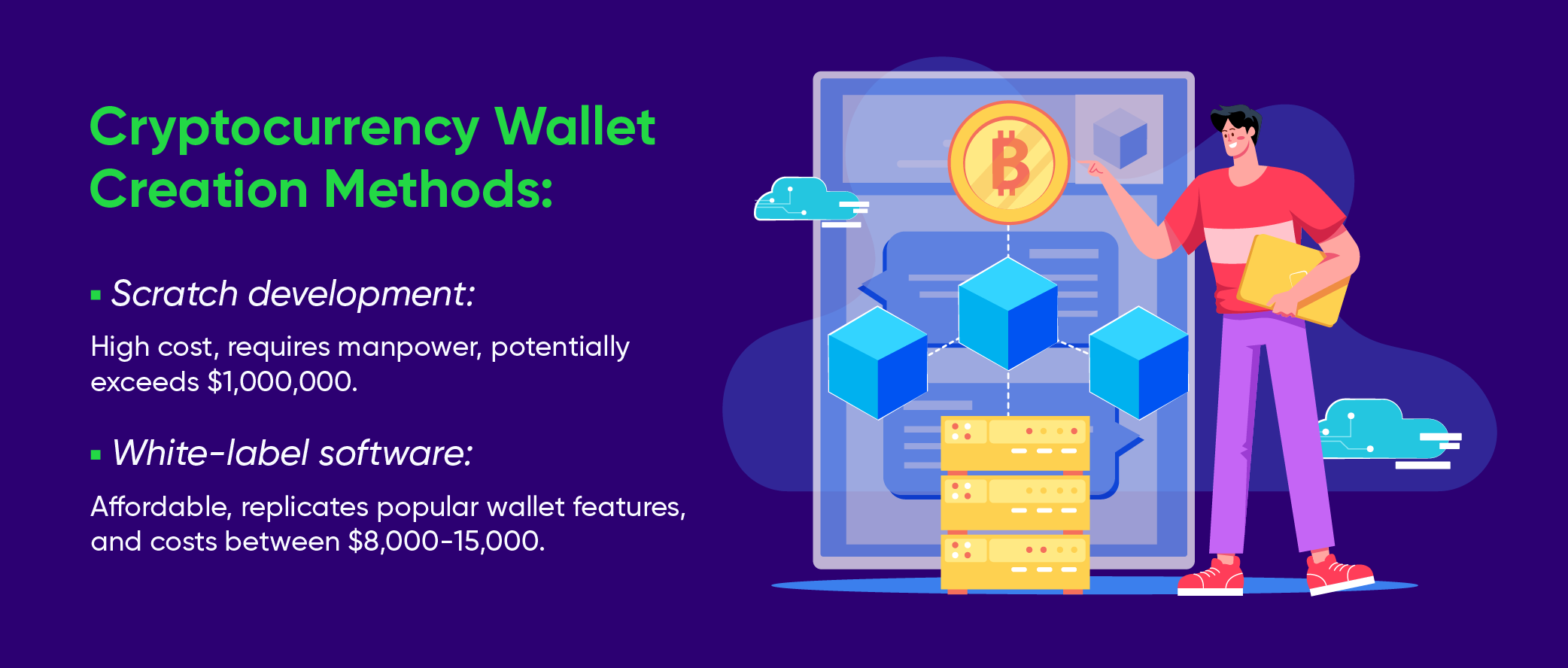
-
Plan & Design
Define essential functionalities, prioritize advanced features, and design a user-friendly interface. Focus on clarity, visual appeal, and a smooth experience for beginners. It is essential to choose appropriate programming languages and frameworks for mobile development, consider blockchain libraries for simplified interaction, and select secure and reliable libraries for encryption and security features.
-
Development
The development phase involves secure key management, wallet functionalities, robust security features like multi-factor authentication (2FA), and secure communication protocols (HTTPS). Rigorous testing is an important part of it. It is essential to identify and fix bugs, with penetration testing being crucial for assessing security vulnerabilities. This ensures smooth integration with chosen blockchains for transactions and secure storage of users’ private keys.
-
Deployment & Maintenance
The process involves preparing your app for submission to the iOS and Google Play Stores, ensuring compliance with guidelines and security requirements, and providing ongoing maintenance and updates based on user feedback.
Must-have Crypto Wallet App Development Features
A cryptocurrency wallet app’s development cost is affected by several features that business owners should think about including in their Crypto Wallet. These features have many advantages and are well worth the investment. Missing these features can make you regret it afterward. So adding these features is essential but has separate costs. Let’s examine which features you should include without even thinking: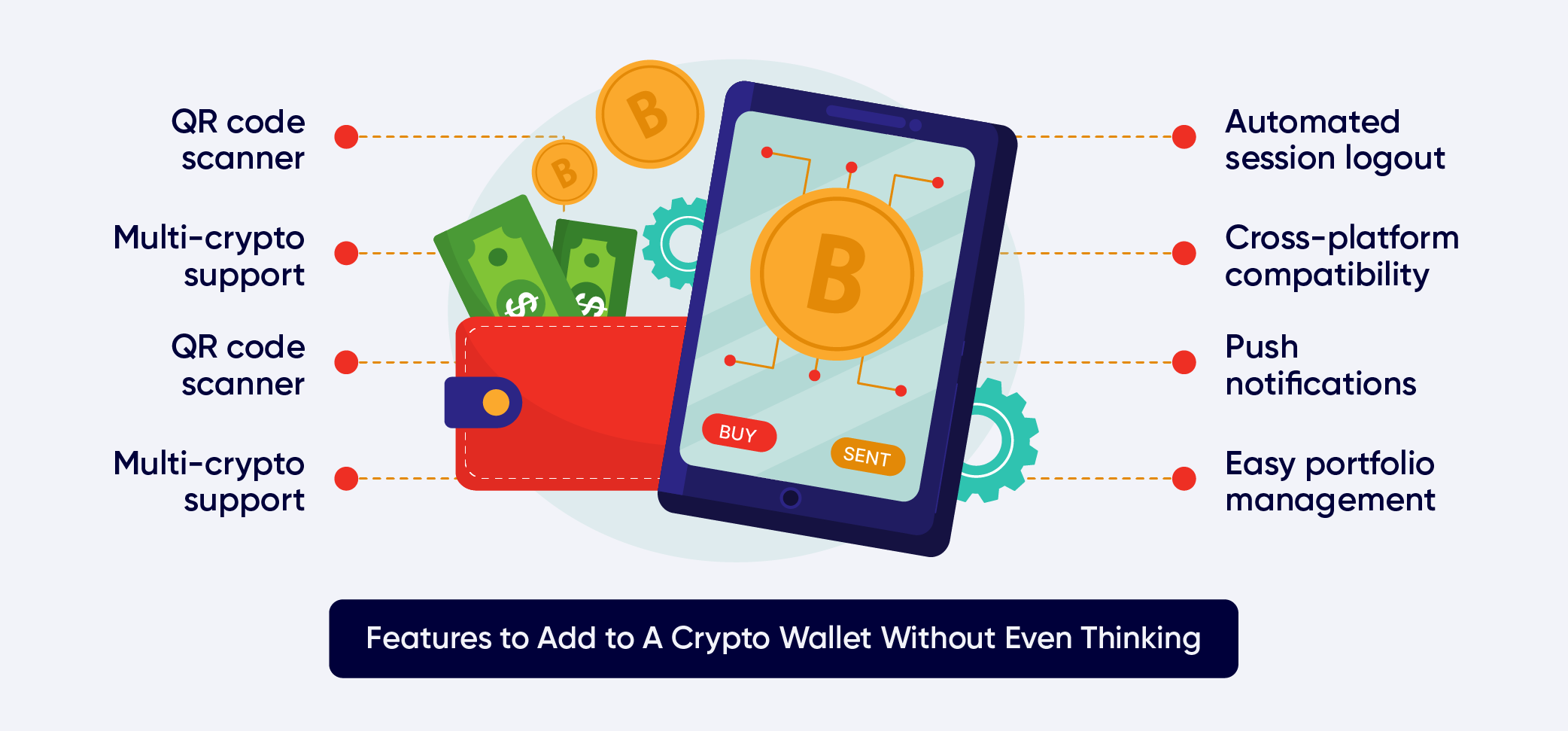
- QR Code Scanner: A private key QR code scanner should be incorporated into the wallet as it is a crucial feature for quick and efficient crypto transfer.
- Multi-Crypto Support: This is a luxury feature for users as it allows users to access various cryptocurrencies in the same wallet.
- Transaction History: This is essential to inhibit in your wallet as it helps store all transactions for smooth and risk-free transactions.
- Real-time Conversion Rates: Real-time rates need to be updated quickly as crypto wallets deal with a lot of transactions.
- Automated Session Logout: This is an important feature as blockchain wallet has a prime requirement of preventing crypto theft during hacks.
- Cross-Platform Compatibility: Making your wallet compatible with multiple platforms can ensure seamless integration with different blockchain platforms.
- Push Notifications: This feature can provide a convenient way for admins to release transaction details and current crypto prices.
- Easy Portfolio Management: A crypto wallet should display popular cryptos at the beginning, simplify trading, and offer security features like biometric authentication, password protection, encrypted transactions, and anti-phishing protocols. Despite their costs, entrepreneurs should invest in these features for significant benefits.
Why Invest In Crypto Wallet App Development: Stats
Crypto wallet app development offers a promising opportunity to capitalize on a growing market. Digital payments have a growing number of users who are adopting digital wallets for convenience and security. The majority of users 53% are Dominant Forces, who use digital wallets more frequently, while 34% are Digital Skeptics, who use them less, suggesting a potential market for conversion. Dual Wielders, who can navigate both digital wallets and traditional payment methods, are also in the market with a percentage of 10%. The Undecided segment, which remains unsure, presents an opportunity for education and outreach. Therefore, investing in crypto wallet app development sits at the forefront of this revolution. Here’s why it’s an attractive investment opportunity: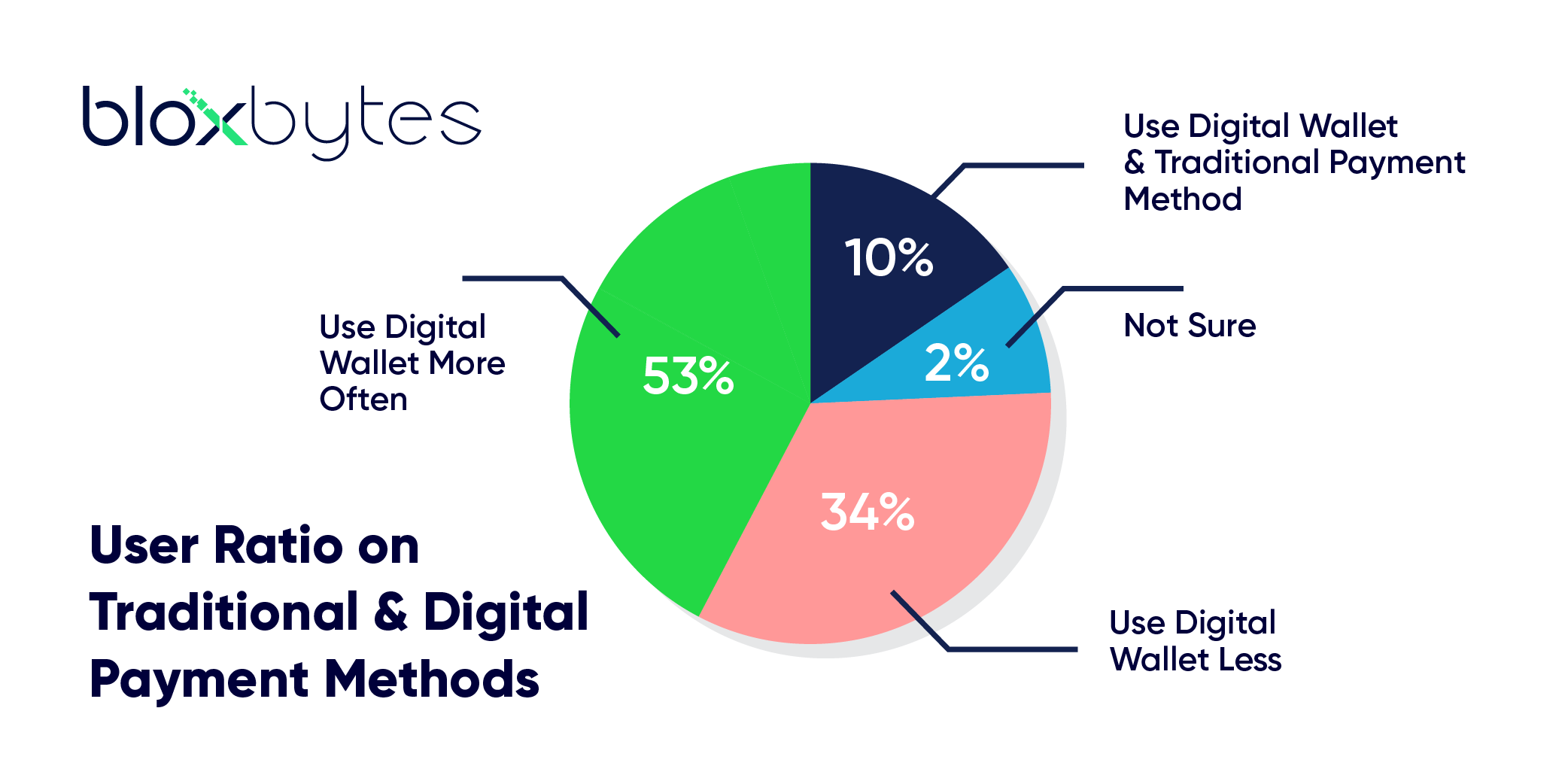
- Crypto wallet app development is a significant sector in the global blockchain market, with a 60% share of the financial sector.
- According to Finance Online, by 2024, $17.9 billion will be spent on blockchain solutions, with the market value projected to grow from $3 billion in 2020 to $39.7 billion by 2025.
- Cryptocurrency hardware wallets are expected to reach USD 1669.3 million by 2029. In 2023, 73.6 million wallet apps were downloaded globally, and by 2026, the global total value of digital wallet transactions is expected to exceed $12 trillion.